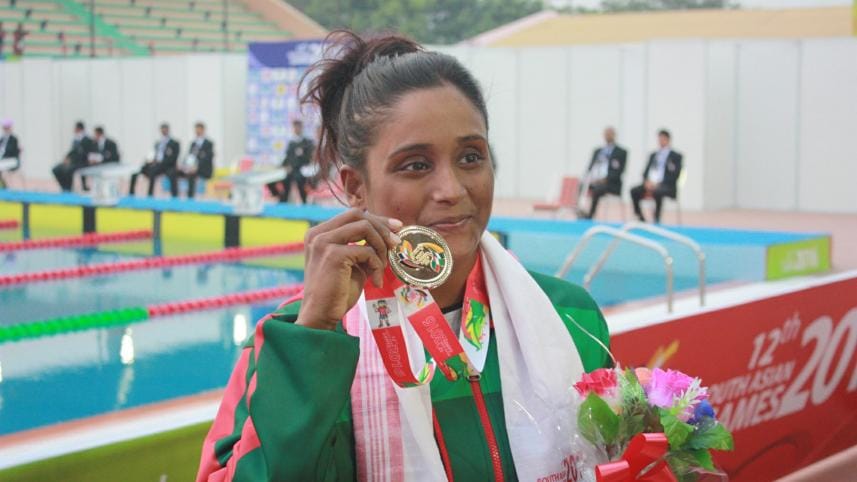Shila in pursuit of fulfilment

Mahfuza Khatun Shila is the country's first and only female swimmer to win a gold medal in the South Asian Games. Shila, currently an employee of Bangladesh Navy, won two gold medals in 2016 SA Games while setting a record in 50m breaststroke. After calling time in 2021, the 33-year-old prepared herself for the coaching profession before getting appointed as the assistant coach of Bangladesh swimming team for the upcoming Asian Games. In an interview with Anisur Rahman of The Daily Star, Shila expressed her thoughts on coaching, present condition and scope of swimming here. The excerpts of the interview are as follows:
The Daily Star (DS): What made you decide to venture into coaching?
Mahfuza Khatun Shila (MKS): Every athlete dreams of playing for the national team. I realized mine by representing the nation and delivering something at international level. There was another childhood dream: to involve myself in coaching, given I could prepare myself for this profession. Although I completed a master's degree in journalism and had different opportunities to work outside sports, I always wanted to remain involved in swimming following my playing career.
DS: How prepared are you as a coach?
MKS: I had a coaching offer two years ago but I did not accept it because I was not ready. My employer, Bangladesh Navy, helped me a lot to prepare as a coach by giving me the responsibility of the Navy women's swimming team. I also underwent a coaching course at BKSP before FINA (International Swimming Federation) sanctioned some courses, including Assistant Coach Level-1. I recently also completed an advanced course on assistant coaching, and I intend to go through more courses. I think I'm now prepared to work with the swimmers.
DS: Before you arrived as coach, former swimmers like Laila Noor, Tania, Mahmuda left the profession, having cited discrimination or from not being assigned. What is the situation now?
MKS: I don't know about the past. The reality is, a different environment exists at different sports federations, BOA or NSC. However, the scope of work for women has been increasing with different federations appointing female coaches. There was no woman coach in swimming here until I arrived. To be honest, I am working comfortably without facing any problems.
DS: Will the recent influx of former national female athletes from different disciplines taking up coaching professions help improve the standard of the country's sports?
MKS: I think two to three factors are most important in coaching. I took up coaching after performing at top level, so I think I have maximum experience that will help me to analyse the problems, thus benefiting the swimmers easily because I went through those situations during my playing career.
Besides, this time around, most players of the national teams are educated and they keep themselves updated via the internet. So, if a former national player can utilize their experience with continuous research in coaching, consequently the standard of the country's sports will certainly improve. Looking at other sub-continent nations, you will see the former players are taking up coaching roles.
DS: What do you wish to deliver as a coach?
MKS: As a swimmer, I succeeded in the South Asian Games and I want my students to surpass me by winning gold medals in the Commonwealth Games and the Asian Games. If it happens, then all my efforts will be worth it. I am constantly studying aspects of coaching, which is not an easy task as people typically think of it.
DS: But can you dream big with a small group of female swimmers?
MKS: The female swimmer previously had less chances to train at the national camps, so I requested general secretary BM Saif bhai to provide more female swimmers in the camp. Of the 25 swimmers for the Asian Games camp, 12 are female swimmers of whom junior swimmers' average height is 5.4 inches. They all have qualities a swimmer needs to possess, and are quick learners, so I am hopeful about them.
DS: Coaching or training, which is harder based on your nearly one-month experience in national camp?
MKS: These are two different things and bring different challenges. If you want to compare, training is harder than coaching because a swimmer always toils hard to achieve a target. On the other hand, coaches' work is more on the intellectual and mental side than physical because they keep an eye on every individual swimmer and prepare training schedules for each individual, based on merits and lackings.
DS: How is your husband Shahjahan Ali Rony, also a SA Games gold-winner, assisting you?
MKS: I'm getting hundred per cent help from him, and he is my mentor too. Having been in the coaching profession since 2016, he has acquired a vast knowledge on it. He understands me from just seeing my face, and advises me accordingly. He even made me understand the language of coaching. So, you can say that Rony makes my job easy.



 For all latest news, follow The Daily Star's Google News channel.
For all latest news, follow The Daily Star's Google News channel.
Comments